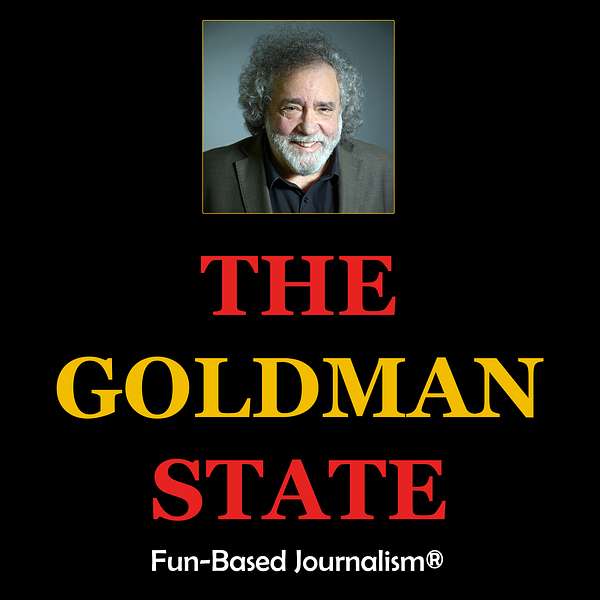
The Goldman State
Ed Goldman is a longtime newspaper and magazine columnist, the author of five books and creator of The Goldman State, a three-times-a-week online column with subscribers in 40 states, Canada and Europe. A professional playwright, composer and painter, Ed has also taught journalism at five California Universities and community colleges. His bucket list includes becoming the victim of a corporate takeover. This podcast is an extension of his unique take on the world around us and his interpretation, with all the creativity imaginable, of what that would literally sound like if he were to speak it.
The Goldman State
Episode 111: Cooking Therapy - A Recipe for Mental Health.
Please text me what you think of this episode. I would love to hear from you.
Can cooking really serve as a form of mental health therapy? Cooking requires focus and provides a delicious distraction from life's ups and downs. For me, that clarity is therapy. Reading a cookbook is also like therapy and when written well, I wonder, does that book belong in self-help or in the "cooking" section of the bookstore? As culinary art, who knew you actually get to eat the masterpiece? There's a thought for you. Therapy that satiates.
Thanks for listening the the podcast and be sure to subscribe to my thrice weekly column, The Goldman State, by visiting the WEBSITE HERE. Thanks for listening.
00:00 - Ed Goldman (Host)
Hi, this is Ed Goldman with the Goldman State Podcast. One of my more reliable creative outlets for the past few decades has been cooking. It engages, requires focus and distracts me from dwelling on problems unrelated to not drying out a roasted chicken or accidentally dressing a fruit salad with sesame oil. Best of all, unlike other artsy pursuits such as painting, writing or songwriting, I get to eat the results, which to me is similar to owning and maintaining a home for several years and realizing it's a savings account I get to sleep in. Cooking is now being used as a form of mental health therapy, though it isn't being enthusiastically blessed as one by many psychiatrists, psychologists, social workers or even short-order cooks, some of whom I consider to be more talented than some vaunted, overindulged chefs the short-order cooks that is. I mean. Have you ever seen how the staff in a fine dining restaurant must pay constant homage to the cook? They have to address him or her as chef, followed by no name. This is how nurses address their boss as doctor and musicians address the person waving that elongated toothpick at them as maestro. I'd try to get people to start calling me columnist, but I'm afraid it would sound like communist, which could cause me some awkward moments, since I often vacation in a red state Quote. Like art therapy or pet therapy, cooking therapy is designed to provide moments of self-reflection as the task at hand takes on new layers of meaning unquote, according to a recent story in the New York Times weekly food section. Then the story overreaches, losing me and, I'm guessing, many of its readers, by adding you're not just softening a mere paw, you're softening yourself. At that point you may be asking yourself what the fire truck is a mirepoix To keep you from wasting your billable hours googling mirepoix. It's what you get when you dice up veggies, cook them in oil or butter, then smush them up as a base for soups or other concoctions. Mirepoix is also how a continually disappointed ma refers to her husband.
02:04
Over the years, my enjoyment of cooking has made me a pretty good partner for people who like to host dinner parties, but consider the dinner part of that as a major stressor. I won't lie that the prospect of my doing all the dishes afterward is a source of eager anticipation. But with a proper partner, this is where the quid meets the pro quo. Now, if you're starting to salivate right about now and thinking I'm going into the kitchen to make waffles and regain my equilibrium, hopes and dreams. Listen some more. Quote.
02:33
There is little research on the efficacy of cooking therapy for clients, a concern among mental health professionals, the Times story points out. Quote people who use cooking as a form of wellness, even if it improves their mental health, are not necessarily engaging in a therapeutic process. Unquote. Uh-huh, then why do the Times even bother to tell us about it? Doesn't the paper care about your billable hours as much as I do? Some years back, my enjoyment of meal making led me to gather up my recipes and write Fear of Frying, understandable Recipes for the Cookbook Challenge. It was in its final draft when the publisher went out of business. It subsequently ran on the website of Sacramento Magazine, which also went out of business. I'd publish it myself, but I'm afraid that if I did, I'd go out of business and while that'd give me more time to cook, I wouldn't be able to buy the food. Man cannot live on Mirepoix alone.